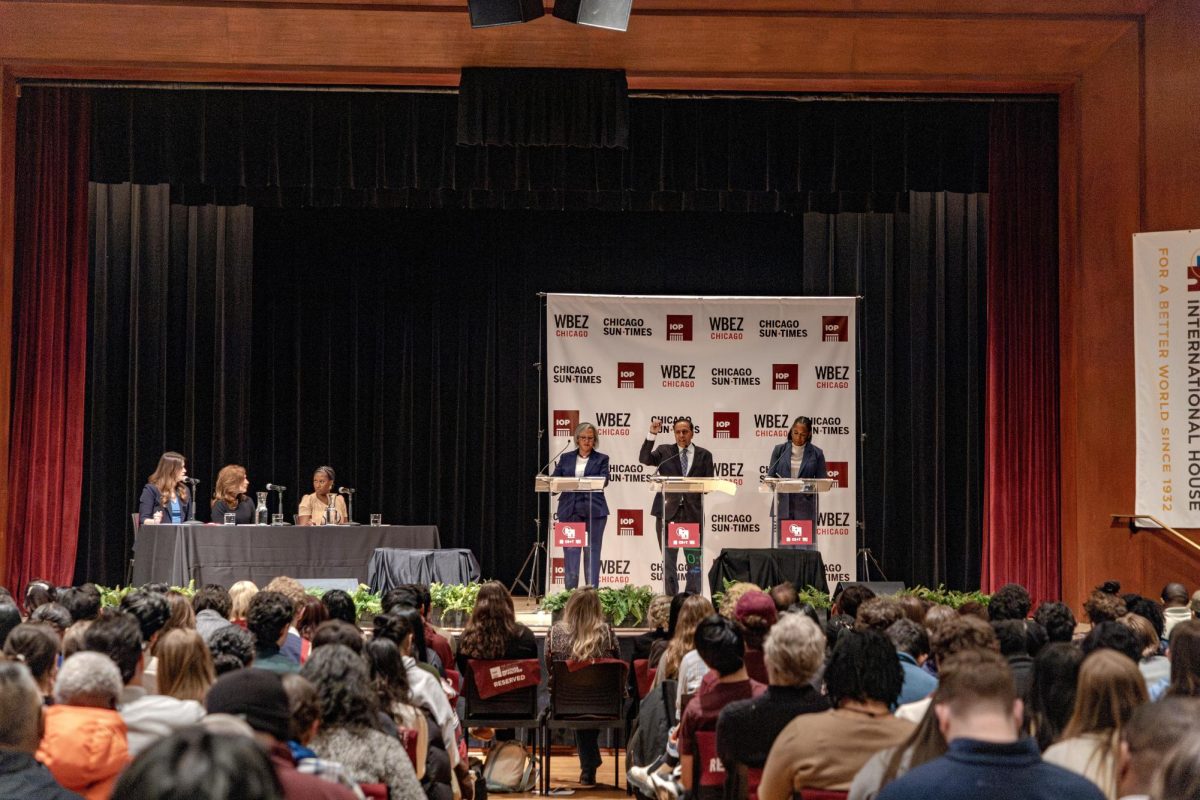November marks the beginning of award notifications for competitive fellowships, with the Rhodes announcement leading the charge. This year, University of Chicago fourth-years Anqi Qu and Francesco Rahe have been named 2025 Rhodes Scholars, the first UChicago students to receive the honor since Yali Peng (LLM ’17) in 2018.
The Rhodes is a prestigious international fellowship that provides funding for exceptional students to pursue postgraduate studies at the University of Oxford–emphasizing leadership, academic excellence, and a commitment to making a positive impact on the world. Their success is just the beginning of a long list of fellowship announcements expected throughout the academic year, including the Fulbright, Marshall, Truman, and Schwarzman scholarships.
The Maroon spoke with the two Rhodes scholars, Anqi Qu and Francesco Rahe, who described their experiences with applying to Rhodes with the support of the College Center for Research and Fellowships (CCRF) at UChicago.
Qu is a fourth-year in the College majoring in economics and statistics while simultaneously getting a master’s in computer science. She represents the Southern African region for the international Rhodes, and plans to pursue a graduate degree in economics at Oxford, with a focus on AI ethics.
Rahe—also a fourth-year in the College—is double-majoring in religious studies and Fundamentals: Issues and Texts. He plans to pursue a master’s degree in classical Indian religion while at Oxford, with a particular focus on translating Sanskrit texts.
“A significant part of the process is trying to figure out what you want to do with the rest of your life, looking at the things you’ve done in the past and how they line up, and how they create this narrative. It’s a process of self-understanding,” said Rahe.
“The [Rhodes] community is made up of people who have been hand-picked because of their care for changing the world… I’m sure I’m going to meet people who are passionate about fields I didn’t even know existed; I hope to learn as much from them as possible,” said Qu.
In addition to being the first UChicago Rhodes scholar to be announced in seven years, Qu is also the first Asian Rhodes scholar to represent the Southern African region in the fellowship. She shared a piece of advice she kept as motivation throughout the rigorous process: “You should never be the person to say no to yourself. If the outcome is a no, then it will be a no, but make sure it doesn’t come from you.”
Rahe added that the application process for Rhodes did not come without tradeoffs. “There were a couple times when I almost dropped out of the process because I was thinking, why am I working on this application? Why am I not working on my translations or my creative writing… but there were a number of things that helped me keep going, one of which was the CCRF staff.”
Qu’s takeaway from her Rhodes experience was the realization that she is fundamentally interested in education. “I wouldn’t be where I am now without having the educational opportunity to pursue my interests. There’s so many people that won’t have these opportunities—very smart people that have so much potential—but without the right education or access, they won’t get them. That’s something that I hope to address,” said Qu.
Rahe spoke on his experience at UChicago, and how the culture of the University helped him cultivate his interest in research. “I grew up in a rural area that I love a lot, but studying things like Persian and Sanskrit weren’t really an option where I grew up. And it was amazing to come to UChicago and to have those options available, and not only available, but encouraged,” Rahe said. “One of the things that has been most inspiring has been… my friends, some of whom have done just incredible, brave, and interesting things. They’ve combined their academic interests with the sort of change that they want to see in the world.”
“It’s important that your work reaches people and that you’re making a difference. I think often, it’s a lot of the work that you don’t expect, a lot of the quiet work, that doesn’t wind up in the news, which is making the biggest difference,” said Rahe. “Fellowships are important…. But in the end, I don’t think they’re the most important thing. What matters is the work you’re doing and the fact that you’re making the world better one step at a time,” concluded Rahe.
The CCRF is the core unit providing support to UChicago students applying for fellowships, and both Rahe and Qu said they were guided by the CCRF throughout the application process. In an interview with the Maroon, CCRF representatives Nicole Fazio and Arthur Salvo spoke about their office’s mission and the role they play in preparing students for national and international recognition.
“My one strength is being able to sit up here and see these extraordinary experiences undergrads have had and help them stitch together what that means for their future,” Fazio said. “We also enjoy being the ‘good news’ office.”
Salvo explained that the CCRF aims to guide students through their academic journeys and inspire them to envision how their talents can shape the world. “Fellowships are fundamentally an educational endeavor where students are thinking about their hopes, their dreams, their ambitions, and their gifts,” he said.
For first- and second-year students, the CCRF’s advice is simple: focus on genuine self-discovery rather than resume-building, such as joining various RSOs. “Be who you are. Learn what you value. Go all in on research, on your academic work, on being in the community—but be all in and then let some of this other stuff start to fall away,” Fazio said.
Fazio said the CCRF provides both philosophical and practical support for students. “We are there at the beginning for the exploration part, we’re inviting students into those spaces where they have to ask questions. What do they get out of bed in the morning for? What are they staying awake up at night worrying about? What breaks their heart? What do they want to change in the world? Those are big questions, and we’re not going to let a student go through that work alone.”
Handling setbacks is also a crucial part of their work. “Not every student is going to win. And so the handling of disappointment means coming alongside them and helping them understand they’re going to realize these dreams, regardless of who pays for it,” Fazio added. “The best news for us to hear at the end of a process is, ‘I was proud of myself… I imagined a future that, before I put it all to paper, I didn’t even realize was mine,’” Fazio said.
According to Fazio, since the CCRF’s founding in 2015, its evolving integration into UChicago’s culture has been key to its success. “There will be a moment where it’s difficult to apply for fellowships, but finding support should not be that sort of difficulty,” she said. The center aims to create an environment at UChicago where students across disciplines feel empowered to pursue research and fellowships as a natural extension of their academic journey, supported by faculty and the CCRF.
For Fazio, the mission is clear. “The success of this office is not based on things. We count the success of this office based on the numbers of students who feel well-served, who are seen for who they are and for the things they’re dreaming about,” she said.















